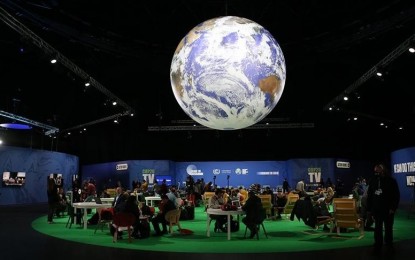
GLASGOW, Scotland – The first week of the COP26 climate summit saw a wide range of commitments with more than 40 countries pledging to phase out coal by 2050.
And more than 100 leaders vowing to halt and reverse forest loss and land degradation by 2030.
This was also the first time that a COP conference included a major event on methane, with 105 countries, including 15 major emitters such as Brazil, Nigeria, and Canada, signing a Global Methane Pledge.
The historic commitment, led by the United States and European Union, alongside the United Kingdom COP26 presidency, equates to 40 percent of global methane emissions and 60 percent of global gross domestic product (GDP).
On the very first day of the summit, US president Joe Biden acknowledged that former US President Donald Trump pulled America out of the Paris climate accord, and that "put us sort of behind the eight ball a little bit.'
Russia and China have sent delegations to Glasgow but not their presidents, which was criticized by other leaders.
Moscow promised to be carbon neutral by 2060 and it is among other signatories of a declaration on forests and land use, pledging an end to deforestation by 2030.
One of the biggest polluters, India, also pledged to get to net-zero by 2070, according to Prime Minister Narendra Modi.
And Australia, even before the summit, as BBC reports, was lobbying the UN to alter an important scientific report on how to tackle climate change.
No surprise, it promised to diminish methane emissions by 30 percent by 2030, and declined to agree to phase out coal-fired power and halt investing in new coal plants at home and abroad.
Climate finance to developing countries
Channeling funds to fight climate change in developing countries was one of the main metrics for success at the summit. But rich countries apparently have not delivered on pledges at the conference.
Rich countries had committed USD100 billion a year by 2020 to help underdeveloped countries tackle the effects of climate change.
But that goal has not yet been achieved, and now the COP26 Presidency said it is highly unlikely to get there in 2021 or next year.
The presidency does, however, say it is certain it will be met by 2023 -- a pledge many see as a huge disappointment.
The statement said the UK would spend £576 million (USD785 million) on a package of initiatives to mobilize finance into developing economies.
Meanwhile, a former governor of the Bank of England made all big western banks sign his Glasgow Financial Alliance for Net Zero, announcing USD130 trillion from 450 financial groups directed at decarbonization.
Several countries made new pledges to level up finance to support developing countries in dealing with the effects of climate change, including a commitment from Norway to triple its climate adaptation finance along with Japan and Australia to double theirs, and vows by Switzerland, the US, and Canada on adaptation funding.
Whitest, most segregated COP ever
Climate activists called the UN summit the whitest, most segregated, most divisive COP, with media and civil society representation from developing countries restricted because of travel restrictions. There were also “red list” impositions and an early closing of the media accreditation system.
Nearly 100,000 people have marched in Glasgow to demand urgent action in the fight against climate change.
"COP26 has been named the most excluding COP ever," Swedish teen Greta Thunberg said in expressing her anger at the climate talks.
"This is no longer a climate conference. This is a Global North greenwash festival. A two-week celebration of business as usual and blah blah blah," she said.
Despite unprecedented commitments from financial institutions to align their portfolios, products and services with the 2015 Paris Agreement, the quality of pledges was not seen as enough to make a real impact. (Anadolu)
